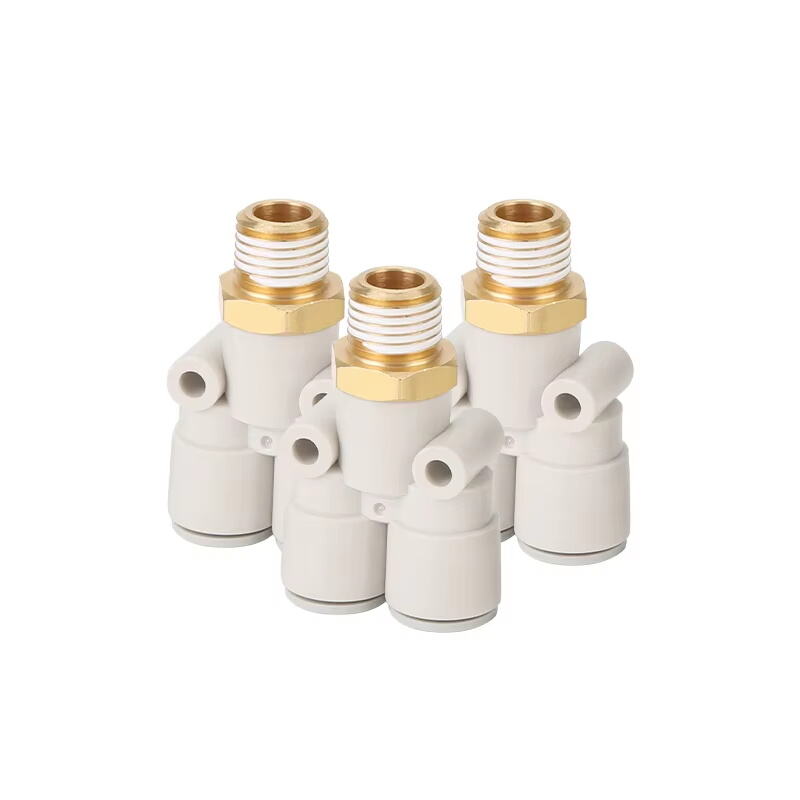Introduction: Can Your Pneumatic Connectors Withstand the Test of Extreme Conditions?
In the high-stakes world of industrial automation and manufacturing, compressed air is the lifeblood of productivity. Yet, this vital system is only as strong as its most vulnerable point: the connection. A failure here—whether a leak, a rupture, or a contamination breach—can trigger a cascade of consequences: costly unplanned downtime, compromised product quality, and even safety hazards. In fact, industry studies suggest that leaks account for 20-30% of compressed air generated, representing a massive and silent drain on profitability.
Choosing the right pneumatic connector isn't just a procurement decision; it's a critical strategic investment in your operation's reliability and efficiency. But with a global market flooded with options, from premium European brands to budget-friendly Asian manufacturers, how do you discern which ones truly deliver on their promises of quality and durability?
This definitive guide cuts through the noise. We will explore the world's leading pneumatic connector brands, dissect what truly sets them apart, and provide you with a clear, actionable framework for selecting the perfect connectors for your most demanding environments. By the end of this article, you will be equipped with the knowledge to optimize your pneumatic system's performance, reduce your total cost of ownership, and make a confident purchasing decision.
Why: The Critical Role of High-Quality Pneumatic Connectors
More Than a Simple Link: The Connector as a System Component
Pneumatic connectors are often underestimated as simple commodities. In reality, they are precision-engineered components that directly influence three core pillars of your operation:
-
System Integrity and Uptime:
Leak Prevention: A single poorly made connector can leak liters of compressed air per minute. High-quality connectors feature precision-machined threads, superior sealing surfaces (e.g., metal-to-metal with integrated O-rings), and robust sealing materials that maintain integrity under pressure cycling and vibration.
Flow Efficiency: The internal diameter and design of a connector directly impact airflow and pressure drop. Premium brands engineer their connectors for minimal flow restriction, ensuring your cylinders and tools receive the full power they were designed for.
-
Safety and Risk Mitigation:
In demanding environments like chemical plants, food processing, or mining, connector failure can be catastrophic. High-quality brands design and test their products to withstand extreme pressures, temperatures, and corrosive substances, protecting both personnel and equipment.
-
Total Cost of Ownership (TCO):
While premium connectors have a higher initial cost, their long-term TCO is significantly lower. They last longer, require less maintenance, prevent costly energy waste from leaks, and eliminate the downtime and labor costs associated with frequent replacements.
What: Defining Excellence in Pneumatic Connectors
What is a Pneumatic Connector? A Broad Definition
A pneumatic connector is a general term for any device used to join sections of pneumatic tubing, hose, or pipe to other components like valves, cylinders, or tools. This category includes:
Quick Connect Couplings: For tool and easy-disconnect applications.
Push-to-Connect Fittings: For fast, tool-free installation on tubing.
Barbed Fittings: For use with clamps on flexible hose.
Compression Fittings: For a tight, permanent seal on tubing.
Threaded Adaptors (NPT, BSPP, BSPT): For connecting to threaded ports.
The Hallmarks of a Top-Tier Brand
What separates a market leader from a generic supplier? Look for these attributes:
Engineering and R&D Investment: Leading brands continuously innovate in materials science and design, using CFD (Computational Fluid Dynamics) to optimize airflow and FEA (Finite Element Analysis) to ensure structural integrity.
-
Rigorous Material Standards:
Brass: Not all brass is equal. Premium brands use lead-free, dezincification-resistant (DZR) brass for superior corrosion resistance, especially critical in wet environments.
Stainless Steel: Grades 303 and 316L are common, with 316L offering excellent resistance to chemicals and saltwater.
Plastics: High-performance polymers like PPS (Polyphenylene Sulfide) and PEEK are used for their light weight, chemical resistance, and mechanical strength.
Precision Manufacturing: Consistency is key. Top manufacturers employ CNC machining with tight tolerances, automated quality control, and 100% pressure testing to ensure every single part that leaves the factory is perfect.
-
Comprehensive Certifications: Look for certifications that matter for your industry:
ISO 9001: Quality Management Systems.
ATEX / IECEx: For use in explosive atmospheres.
FDA/USP Class VI: For materials safe for food, beverage, and pharmaceutical applications.
WRAS: UK Water Regulations Advisory Scheme (for water and air).
How: How to Evaluate and Select the Best Brand for Your Needs
A 5-Step Selection Framework
Navigating the brand landscape requires a structured approach.
-
Audit Your Application's Demands:
Environment: Is it a standard factory floor, washdown area (IP67/IP69K), chemically corrosive, or explosive (ATEX)?
Pressure & Temperature: What are your max and operating PSI/bar and °C/°F? Always spec a connector rated for above your max operating pressure.
Media: Is it just clean air? Or does it contain lubricant (oiled air), moisture, or other chemicals?
-
Understand Your Performance Priorities:
Rank these in order of importance: Cost (initial vs. long-term), Performance (minimal pressure drop), Durability (cycle life), Ease of Installation (maintenance time).
-
Research and Shortlist Brands:
-
Top Global Tier (The Established Leaders):
Legris (by Parker): A pioneer in push-to-connect technology, renowned for innovation, quality, and a vast product range. A go-to for high-end automation.
Festo: Synonymous with German engineering excellence. Offers a incredibly broad range of high-performance, reliable connectors and automation components.
SMC Corporation: A Japanese giant offering an enormous portfolio of high-quality, reliable products with a strong global presence and support network.
Parker Hannifin: An American powerhouse known for extreme durability and performance in harsh environments. Their products are often industry benchmarks.
-
High-Value Tier (Quality with Competitive Pricing):
Brands like ours: Many manufacturers, including us, have invested heavily to achieve a quality parity with the top tiers while offering significantly better value, faster delivery, and more flexible customization options. We meet international standards and often exceed them in specific applications.
-
-
Request and Test Samples:
Any reputable brand will provide free samples. Test them! Perform a pressure decay test, check the feel of the threading and engagement, and subject them to a real-world simulation in your facility.
-
Evaluate the Supplier, Not Just the Product:
Technical Support: Can they provide expert advice?
Lead Times & Availability: Is stock readily available?
Customization: Can they provide bespoke solutions?
Pros and Cons: An Objective Look at the Brand Landscape
| Brand Tier | Pros | Cons |
|---|---|---|
| Top Global (e.g., Festo, SMC, Parker) |
Unmatched Brand Recognition: Proven track record in extreme applications. Extensive R&D: Cutting-edge innovation. Global Support & Availability: Large distributor networks. Comprehensive Product Range: One-stop-shop for all pneumatic needs. |
Premium Price: Significantly higher initial cost. Less Flexibility: Standard products may not suit unique needs. Potential for Longer Lead Times on specialized items. |
| High-Value / Specialist (e.g., Our Brand) |
Excellent Value: High quality at a more competitive price point. Agile & Responsive: Faster lead times and more willing to customize. Direct Relationship: Often provides more direct access to engineering support. Focused Expertise: May excel in specific niches. |
Smaller Global Footprint: May have fewer local distributors. Brand Prestige: Lacks the instant recognition of a decades-old global name. Portfolio Breadth: Range may not be as vast as the largest players. |
| Generic / Low-Cost | Very Low Initial Cost. |
High Risk: Inconsistent quality, higher failure rates. High TCO: Prone to leaks, failures, and frequent replacement. No Technical Support. Potential Safety Liability. |
Verdict: For mission-critical applications where failure is not an option, the top global brands are a safe, albeit expensive, bet. However, for the vast majority of industrial applications, high-value brands offer the optimal balance of proven quality, reliability, and cost-effectiveness, often providing a superior return on investment.

